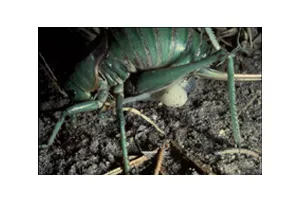
Gwynne honoured for studies in animal behaviour
For the sake of authenticity, applause for Professor Darryl Gwynne’s Quest Award should be accompanied by the noises of a summer night made by katydids and crickets. After all, it is the study of the sexual behaviour of these insects that has brought Gwynne, a biologist at the University of Toronto Mississauga, prominence as an entomologist.
The Quest Award is given by the Animal Behavior Society to recognize an outstanding seminal contribution in animal behaviour. Gwynne, named a fellow of the society in 1994, will be recognized this year for his contribution to the understanding of sex differences in animal behaviour. He was the first to demonstrate experimentally that changes in relative parental investment by the male and the female would cause a change in sex roles during mating.
“During the 1990s, I was using insect systems to test some ideas about what controls sex differences across the animal kingdom,” said Gwynne.
“Males are usually the showy sex,” he noted, “and it’s all about reproductive sexual success. The more attractive they are, the more they get mated and the more genes they pass on.”
This is an idea that has been around since Darwin’s theory of sexual selection, said Gwynne, but in the 1970s, the concept of differential parental investment arose to help explain why sex differences in showy behaviour had evolved. Scientists demonstrated that usually, the females contribute more to nurturing offspring, so they weren’t as available as males for mating. Therefore, males evolved to be more colourful and more aggressive to compete for a scarce resource, and the available females could afford to be choosy in selecting their mates.
Gwynne, however, discovered that in some insect species, the sex roles weren’t fixed; they varied depending on the environment. For katydids, also known as bush crickets, the determining factor was the availability of food.While inseminating a female with a sperm packet, a male katydid also produces a packet of a cheesy substance that attaches to the female’s genitalia.
“It is highly nutritious and is about 40 per cent of the male’s body weight in some species,” said Gwynne.

“We now realize that what insects do is not fixed,” said Gwynne. “They are incredibly complex and their behaviour is very plastic in response to changes in the environment.”
Gwynne’s findings have been published in a variety of prestigious journals, including Science and Nature, and they are included in most university animal behaviour textbooks and cited regularly by other scholars.
In her letter nominating Gwynne for the award, U of T Scarborough biology professor Maydianne Andrade from--a former student of Gwynne’s--wrote, “He is a true animal behaviorist, with an eye for detail and a keen ability to link his observations to theory and produce testable predictions grounded in realistic biology.”
Despite the award, it’s unlikely that Gwynne will rest on his laurels; there is always more to learn about insects, a subject that has fascinated him since childhood.
“One of the things I like about insects is their great diversity,” Gwynne said. “It’s way above what you find in mammals, birds and fish. I stumble on things that are new all the time."
